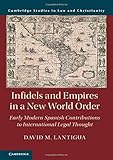Infidels and empires in a new world order : early modern Spanish contributions to international legal thought / David Lantigua, University of Notre Dame.
Material type: TextSeries: Law and Christianity [Cambridge]Publisher: Cambridge, United Kingdom ; New York, NY, USA : Cambridge University Press, 2021Copyright date: c2020Edition: First paperback editionDescription: xv, 356 pagine : illustrazioni ; 24 cmContent type:
TextSeries: Law and Christianity [Cambridge]Publisher: Cambridge, United Kingdom ; New York, NY, USA : Cambridge University Press, 2021Copyright date: c2020Edition: First paperback editionDescription: xv, 356 pagine : illustrazioni ; 24 cmContent type: - testo (txt)
- senza mediazione (n)
- volume (nc)
- 9781108498265
- 9781108735575
- 341.4/85209031 23
- KZ 1242.L36 2020
| Item type | Current library | Call number | Status | Barcode | |
|---|---|---|---|---|---|
 Opera (Magaz.)
Opera (Magaz.)
|
Biblioteca "Angelicum" Pont. Univ. S.Tommaso d'Aquino Temporary Library | KZ 1242.L36 2020 (Browse shelf(Opens below)) | Available | 0030219499 |
Browsing Biblioteca "Angelicum" Pont. Univ. S.Tommaso d'Aquino shelves, Shelving location: Temporary Library Close shelf browser (Hides shelf browser)
Include bibliografia e indice.
Introduction: International Relations beyond Westphalia -- Theocratic World Order and Religious Wars -- Spanish Dominicans and the 'Affair of the Indies' -- The Politics of Natural Law at Valladolid, 1550- -- From Infidels to Savages : Empires of Commerce and Natural Rights -- The Scholastic Law of Nations, Native Occupation, and Human Solidarity -- Conclusion.
"The universal 'rights of man' and the international 'system of states' often appear as the crowning achievements of the Western political imagination for modern international relations. The quelling of religious wars across Europe under a stronger policy of toleration and the rise of territorial sovereignty set the tone for a form of international relations breaking free from Latin Christendom and the grip of the papacy. Yet longstanding scholarly attention on political citizenship and national sovereignty within Reformation Europe after the iconic 1648 Peace of Westphalia often disregards the ideological underside of universal natural rights claims in extra-European contexts of imperial conquest and colonial settlement. European assertions of a natural right to punish and subjugate populations deemed unfit to govern themselves and an exclusive right to private property in foreign lands, bolstered by biblical and theological justifications, provided legal armor to early modern and modern expansion in the Americas, Africa, and Asia".









